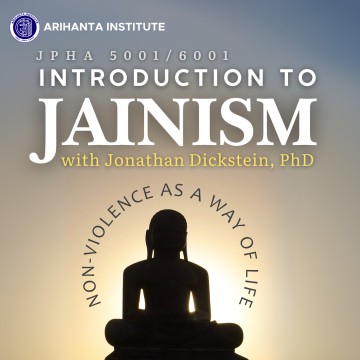Introduction to Jainism: Non-violence as a Way of Life
Introduction to Jainism: Non-violence as a Way of Life
 Fall 2025 (classes begin September 2, 2025 and end December 8, 2025)
Fall 2025 (classes begin September 2, 2025 and end December 8, 2025)Wednesday 8:00 - 10:50 a.m. PT
Course JPHA50016001
This course provides an introduction to Jainism in India with a focus on the three “B”s—Belief, Behavior, Belonging. The course surveys the emergence of Jainism in ancient India, the life and teachings of Lord Mahavira, the ascetic and lay aspects of Jain society, Jain philosophy and ethics, and religious practices such as vegetarianism, fasting, and worship. The course lends particular emphasis to the ethic of ahiṃsā (non-violence) and its implications for contemporary Jain animal ethics and environmentalism.
Upon successful completion of this class, students will be able to:
- Chart the historical development of Jainism in India.
- Identify the major features of Jain philosophy.
- Connect Jain philosophy to Jain practice, both ritual and ethical practice (“Applied Jainism”).
- Describe Jainism as a lived religion with its contemporary lived communities and aspects.
- Describe ethical contestations within Jain communities as they engage current issues such as feminist critique, consumer capitalism, industrial agriculture, climate collapse, and social justice writ large.
Learning Area
 Jain Philosophy, History & Anthropology
Jain Philosophy, History & Anthropology Instructor
 Jonathan Dickstein, PhD
Jonathan Dickstein, PhD
Jonathan Dickstein, PhD, the Tirthankara Shreyansanath Endowed Assistant Professor of Jain and Vegan Studies at Arihanta Institute, specializes in South Asian Religions, Religion and Ecology, and Comparative Religious Ethics. He received his doctoral degree in Religious Studies from the University of California, Santa Barbara, where he wrote his dissertation on ancient Indian animal taxonomies and their relevance for religious ritual and dietary practice. Jonathan’s current work focuses on Jainism and contemporary ecological issues, and accordingly extends into Critical Animal Studies, Food Studies, and Diaspora Studies.
Jonathan has published in a wide array of interdisciplinary journals on topics such as veganism and politics, yoga and diet, Jain veganism, and the ethic of nonviolence (ahiṃsa). Jonathan considers himself a scholar-practitioner, having spent many years not only in libraries but also in public advocating for justice for both humans and nonhumans alike.
Jonathan has published in a wide array of interdisciplinary journals on topics such as veganism and politics, yoga and diet, Jain veganism, and the ethic of nonviolence (ahiṃsa). Jonathan considers himself a scholar-practitioner, having spent many years not only in libraries but also in public advocating for justice for both humans and nonhumans alike.
Enrollment Options
14-DAY FREE TRIAL
- Free, unlimited access to our self-paced courses for 14-days.
- Already used your free trial? Enroll in our Monthly or Annual Membership options at anytime and continue learning immediately!
MONTHLY MEMBERSHIP
- $45 USD / Month
-
Immediate access to course
#### | Name. - Unlimited access to our live and self-paced courses for one month, with month-to-month auto rollover.
- Excludes graduate seminars, language courses, and courses hosted on partner platforms.

